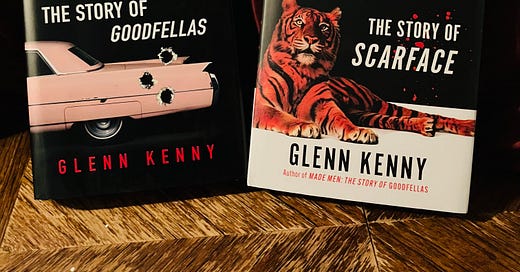Next Tuesday, May 14, at 6 PM, I’ll be joining Glenn Kenny at Mysterious Bookshop for a discussion of The World Is Yours: The Story of Scarface, his brand new book about the 1983 movie starring Al Pacino, written by Oliver Stone, and directed by Brian De Palma.
Glenn writes on movies for The New York Times and many other places; I’ve known Glenn for several years and am certain this will be an enjoyable conversation.
More importantly, the book is great. Kenny did new interviews with De Palma, Stone, Michelle Pfeiffer, Steven Bauer, and many others, but all these reasonably frank conversations are subservient to the larger tale. Kenny is certain but not authoritarian. We begin with Prohibition and the original book and movie Scarface, both loosely based on the the then-living legend Al Capone. Fast forward 50 years, cocaine replaces booze, and Pacino, DePalma, Stone and producer Martin Bregman put a remake together. This backstory is riveting, I missed a subway stop while reading about producer Bregman.
Once the movie has wrapped, the crew has to secure an R rating, for at first the rather conservative film advisory board insisted on giving the movie an X. Needless to say, by modern standards, Scarface isn’t that bad, but it’s true the film has an unremitting intensity. I have a favorite new quote from Jay Cocks, the critic and screenwriter who was in DePalma’s corner and helped get Scarface an R: “I was going to say it’s over the top, but there is no top in that movie.”
Kenny then takes us through Scarface scene by scene, offering context for all significant actors, settings, and music cues. Eventually there’s the aftermath: modest success at first, cult favorite by now, embraced by the hip-hop community along the way. Kenny even gives quick but telling overviews of Scarface’s “children,” De Palma’s The Untouchables and Carlito’s Way, the latter with Pacino.
This is the second Kenny book about a gangster movie; his first was Made Men: The Story of Goodfellas, which is just as entertaining as The World is Yours.
Probably most people would say Goodfellas is greater than Scarface. No objection from me, and I doubt from Kenny, either. The larger point is that these movies quite literally shape our cultural landscape. How did they come to be? Is it odd that our society values gangster movies so highly? On every page of these two books, Kenny has answers.



